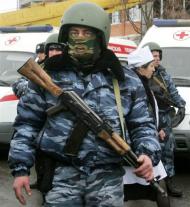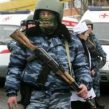
Ingush Authorities Blame Insurgency on Arabs and U.S. Intelligence
Publication: North Caucasus Weekly Volume: 10 Issue: 7
By:

Yunus-bek Yevkurov marked his first 100 days as president of the Republic of Ingushetia in a somber atmosphere. During the past week, the authorities in Ingushetia, including the president, searched for three possible suicide bombers who allegedly arrived in Ingushetia from outside the republic to carry out a terrorist act and shared the extraordinary news with the population through mass media (Lenta.ru, February 6).
In recent years Ingushetia has grown accustomed to two types of daily events: 1) operations carried out by the armed opposition against the authorities and 2) military operations conducted by the law enforcement authorities against members of the armed resistance. This is why it was initially difficult to understand why the armed underground found it necessary to invite militants from outside the republic when it was experiencing no shortage of militants inside Ingushetia to carry out armed assaults on government officials, clerics and law enforcement officers.
The Moscow-based journalist Yulia Latynina’s explanation that the local militants did not want to be responsible for spilling the blood of fellow Ingush does not withstand scrutiny (“Kod Dostupa” [Access Code] program, Radio Ekho Moskvy, February 14).
The members of Ingushetia’s Sharia Jamaat led by Emir Magas do not have affiliations with any particular clans. In other words, they are no longer bound by the traditional family ties of an Ingush society. The principle of membership in the Muslim ummah trumps all other considerations and if there are innocent lives lost in the course of a militant operation, the jamaat members believe that their fates would be favorably decided by the Almighty. Achievement of the ultimate objective is of paramount concern for the jamaat members and they are ready to sacrifice more if they have the means to do so. They have shed so much blood of their fellow Ingush that it is irrelevant to discuss the ethical aspect of this circumstance. For instance, there was the midnight attack on Nazran on June 22, 2004, which resulted in dozens of killed and wounded Ingush (https://lenta.ru/vojna/2004/06/23/versions).
While the law enforcement authorities were carrying out their unsuccessful military operation to detain the militants in Nazran, an administrative building was set ablaze in the settlement of Ekazhevo, which is not far from the city. That same evening, after the security operation in Nazran was over, a sniper from among the jamaat members fired at a checkpoint on a road in Nazran, wounding a traffic police officer (RIA Novosti, February 8).
In an interview with the Russian newspaper Novaya Gazeta published on February 9, Yevkurov laid the blame for the violence squarely with the “newly arrived Arabs,” stating that they were responsible for destabilizing the situation in the region in general and in Ingushetia in particular. Moreover, Yevkurov also blamed the “American and English special services.” Another interesting feature of Yevkurov’s interview was his admission that the authorities must be facing more than just a thousand militants. Yevkurov cited endemic corruption in the republic as the main reason why youths have joined the militants. However, the president did not bother to explain why 16-and 18-year-old boys would be concerned with corruption in Ingushetia, when in reality they are much more worried about the religious persecution of those suspected of adhering to the Salafi ideology, and the numerous assassinations of young men during so-called counter-terrorist operations. It seems that the popular theme of fighting corruption, which was pitched from Moscow, has become the motto of the new president of Ingushetia, who likes to portray it as the root of all of the republic’s problems.
Meanwhile, on February 10, the militants killed a traffic police officer in the Tsentr-Kamaz neighborhood of Nazran—precisely the neighborhood where law enforcement officials launched a combat operation against the militants two days later. During this operation, four members of the Special Operations Police Squad (OMON) from the Central Directorate of Internal Affairs of Murmansk Oblast were killed and fifteen were wounded (Radio Ekho Moskvy, February 12). According to other reports, twenty-four people, including three city residents, were wounded during the operation (Lenta.ru, February 13).
However, the independent on-line publication Ingushetia.org gave a completely different version of what happened. Citing information received from a source inside Ingushetia’s Interior Ministry, the website reported that between 15 and 20 police officers were killed in the operations, including four OMON members (Ingushetia.org, February 12). Ingushetia.org cited comparable figures regarding the number of wounded. Apparently, in the course of a routine document check, teams from the Federal Security Service (FSB) and Interior Ministry managed to contain and blockade the group of militants in house No.8 on Gorovozhdev Street in Nazran. An ensuing shootout with the militants (whose precise number has yet to be established) lasted several hours and the law enforcement authorities had to use armored personnel carriers. As the battle drew to a close, the militants managed to destroy two APCs and one Ural military truck. When it seemed as if the militants had been wiped out, the first group of police officers entered the house, after which there was a powerful explosion that obliterated the entire structure. Apparently it was that explosion which claimed the majority of victims among the law enforcement officers involved in the operation.
Despite the fact that the house was completely leveled (and several other residential buildings in the neighborhood suffered collateral structural damage), the FSB hurried to inform the public that its operatives had found three passports of individuals who were on the federal wanted list as potential suicide bombers. The FSB identified a local resident Khasan Mutaliev as one of the three (aka “Mustafa,” according to the customary FSB version, he was presented as the local cell leader). The body parts as-yet-unidentified resistance fighters were also discovered at the blast site. According to the FSB version, these body parts may belong to two residents of Karachaevo-Cherkessia, 27-year-old Edgar Kopsergenov and 18-year-old Alina Okhtova (the FSB alleged that they were a married couple), as well as the resident of Tyumen Oblast, Sergei Mokin, who was an ethnic Russian. It was precisely this trio of outsiders who were supposed to undermine the authorities in the Republic of Ingushetia, according to the FSB’s version of events. To that end, according to the authorities, the three had apparently stashed 70 kg of TNT (Ingushetia.org, February 12). Subsequently, however, apparently the FSB decided that this amount was insufficient and it was increased to 800 kg of TNT (Interfax, February 13), but a day later this figure was once again inflated when it was rounded up to 1 ton of TNT (Lenta.ru, February 14).
Equally intriguing is the fact that the FSB assigned two nicknames to the slain Khasan Mutaliev: Mustafa and Abdullah. Apparently, the Russian security services do not see the obvious difference between two completely different nicknames. In the given case, Khasan Mutaliev is the brother of Hussein Mutaliev, who was shot in front of his family and taken to North Ossetia on March 15, 2007. It is this circumstance alone that the Russian special services are basing their characterization of Khasan Mutaliev as a “leader of militants.” By surveying the on-line forums of Ingush websites it is easy to see that such acts against young Ingush radicalize the republic’s youth, who become more aggressive and seek revenge. That is why President Yevkurov ought to read what his young compatriots write on these web forums, because he would see that their posts are devoid of any mention of the corruption problem.
Ingush youth are joining the underground not out of some misplaced romanticism and not always to get revenge for the deaths of relatives, but because an increasing number of young Ingush are riding the wave of the ideological struggle against the federal authorities in Ingushetia.




